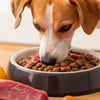Why My Dog Won't Eat Kibble: Understanding and Solving the Picky Eating Problem
- Houndsy
Table of Contents
- Introduction
- Understanding Your Dog’s Eating Habits
- Why Dog Food Quality Matters
- Solutions to Get Your Dog Eating Again
- When to Seek Veterinary Help
- Key Takeaways
Introduction
Did you know that approximately 15% of dog owners face the frustrating dilemma of a pet that suddenly refuses to eat their kibble? This can be a perplexing scenario, especially when your dog has previously enjoyed their meals. As loving pet parents, we often find ourselves asking, “Why won’t my dog eat kibble?” Understanding the reasons behind this behavior is crucial for ensuring our furry companions remain healthy and happy.
In this blog post, we will delve into the various factors influencing a dog's appetite, explore potential health concerns, and examine behavioral aspects that might contribute to your dog's pickiness. We will also provide practical solutions to encourage your pooch to enjoy their kibble once again. By the end of this article, you will have a comprehensive understanding of why your dog might be turning their nose up at kibble and how to address it effectively.
Whether you're a seasoned dog owner or a new pet parent, we invite you to reflect on your dog’s feeding routine and habits. Together, we can find the best approach to tackle this common issue.
Understanding Your Dog’s Eating Habits
Every dog is unique, and their eating habits can vary significantly based on a range of factors. To address the question of why our dogs refuse to eat kibble, we first need to understand their behavior and preferences.
Medical Reasons for Not Eating Dog Food
- Dental Issues: Just like humans, dogs can experience dental pain. Broken teeth, gum disease, or other oral health problems can make chewing kibble uncomfortable. If your dog suddenly prefers softer foods, a dental check-up might be in order.
- Gastrointestinal Problems: If your dog has an upset stomach, they might shy away from their usual kibble. Factors such as eating something they shouldn’t have, food intolerances, or digestive disorders can lead to nausea, making them reluctant to eat.
- Serious Health Conditions: Conditions like kidney disease, liver issues, or even cancer can significantly affect a dog’s appetite. If your dog has stopped eating for an extended period or shows other signs of illness, it’s essential to consult your veterinarian.
Behavioral Reasons for Not Eating Dog Food
- Stress and Anxiety: Dogs are sensitive creatures. Changes in their environment, such as moving homes or new pets, can lead to anxiety that might cause them to refuse food.
- Picky Eating Behavior: Some dogs develop preferences and can become picky eaters if they associate refusing their kibble with receiving more appealing foods, like table scraps.
- Boredom with Food: Kibble fatigue is a common issue. If your dog has been eating the same flavor for weeks or months, they may lose interest. Switching flavors or brands can rekindle their enthusiasm for mealtime.
- Overfeeding: Dogs that receive too many treats throughout the day may not feel hungry enough to eat their kibble. Treats should only make up about 10% of their daily caloric intake.
The Impact of Treats on Eating Habits
While treats can be a great way to reward our dogs, they can also lead to decreased interest in their regular food. If your dog fills up on treats, they may not be eager to eat their kibble at mealtime. As responsible pet owners, we should limit treats and ensure they are part of a balanced diet.
Why Dog Food Quality Matters
Not all kibble is created equal. The quality of dog food can significantly affect a dog’s eating habits. Low-quality kibble made with artificial additives may not appeal to dogs as much as higher-quality options. Here are a few reasons why investing in good-quality kibble is essential:
- Palatability: High-quality kibble typically has better taste and smell, making it more appealing to dogs. This can make a significant difference for picky eaters.
- Nutritional Value: Quality kibble is formulated to meet the specific dietary needs of dogs, ensuring they receive essential nutrients for their overall health.
- Digestibility: High-quality ingredients are generally more digestible, which can improve your dog's appetite and encourage them to eat more consistently.
Solutions to Get Your Dog Eating Again
If your dog has stopped eating kibble, don’t despair! There are several strategies you can implement to encourage them to dig in:
1. Mix It Up
Consider adding a small amount of canned food, bone broth, or a homemade topping to your dog’s kibble. This can enhance the flavor and make the meal more enticing. Just be cautious not to overdo it, as your dog may become accustomed to the toppings and refuse plain kibble again.
2. Change the Feeding Routine
Dogs thrive on routine. Try feeding your dog at the same times each day and removing uneaten food after 15-20 minutes. This can help create a sense of urgency at mealtime and encourage your dog to eat.
3. Experiment with Different Brands or Flavors
If your dog has become bored with their current kibble, consider switching to a different brand or flavor. Look for high-quality options with natural ingredients that appeal to your dog’s preferences.
4. Improve the Eating Environment
Ensure your dog’s feeding area is calm and quiet. If they feel anxious or distracted, they may be less inclined to eat. A comfortable space can make a significant difference.
5. Increase Hydration
Adding water to your dog's kibble can make it more palatable and encourage them to eat. Hydration is also essential for overall health, so ensure your dog has access to fresh water at all times.
6. Use Interactive Feeders
Puzzle feeders and interactive toys can make mealtime fun and stimulating. This not only encourages your dog to eat but also provides mental enrichment.
7. Limit Treats and Table Scraps
Reduce the number of treats you give your dog throughout the day. This ensures they come to mealtime hungry and more likely to eat their kibble.
8. Consult Your Veterinarian
If your dog’s appetite doesn’t improve or if there are signs of illness, it’s crucial to consult your veterinarian. They can help identify any underlying health issues and provide tailored advice.
When to Seek Veterinary Help
If your dog refuses to eat for more than 24 hours, shows signs of distress, or displays other concerning symptoms, it’s time to seek veterinary advice. Early intervention can make a significant difference in your dog’s health and recovery.
Key Takeaways
- Understanding the reasons behind your dog’s refusal to eat kibble is crucial for addressing the issue.
- Medical concerns, behavioral factors, and food quality all play a role in your dog’s eating habits.
- Implementing practical solutions, from mixing in toppings to changing feeding routines, can encourage your dog to enjoy their kibble once again.
- Always consult your veterinarian if you have concerns about your dog’s health or appetite.
As dedicated pet parents, we want the best for our furry friends. At Houndsy, we understand that the feeding experience should be convenient, consistent, and beautiful. That’s why we designed the Houndsy Kibble Dispenser to simplify mealtime and ensure your dog enjoys their food. With features like perfect portion control and a stylish mid-century modern design, feeding your dog has never been easier or more enjoyable. Check it out here.
FAQ
Why does my dog suddenly refuse to eat kibble?
There could be several reasons, including dental issues, gastrointestinal problems, or behavioral factors such as stress or boredom.
How can I encourage my dog to eat their kibble again?
You can try mixing in canned food or toppings, changing their feeding routine, and ensuring a calm eating environment.
Should I be concerned if my dog stops eating?
Yes, if your dog refuses to eat for more than 24 hours or shows signs of illness, it’s important to consult your veterinarian.
Can I switch my dog’s kibble brand?
Absolutely! Trying different brands or flavors can help rekindle your dog’s interest in their food.
How can I prevent my dog from becoming a picky eater?
Establish a consistent feeding routine, limit treats, and ensure they have a balanced diet to encourage healthy eating habits.
By understanding the reasons behind your dog’s picky eating habits, we can work together to ensure they enjoy their meals and maintain a healthy, balanced diet. Remember, we’re here to support you in creating the best feeding experience for your beloved pet!












